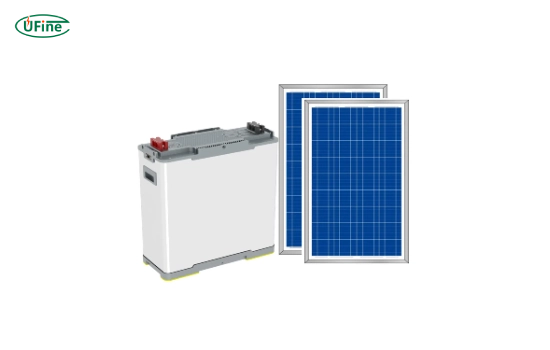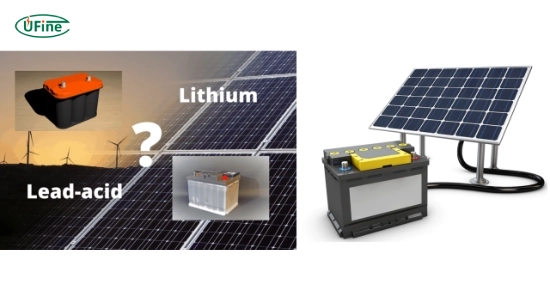Solar energy is becoming essential as more people turn to renewable energy sources. You need a reliable energy storage system to maximize solar power. That’s where lithium-ion batteries come in. These batteries store excess energy generated by solar panels during the day, allowing you to use them when the sun isn’t shining. But with so many options available, how do you decide which lithium-ion battery is best for solar? Let’s dive into the details to help you make an informed decision.
Part 1. What is a lithium ion battery?
A lithium-ion battery is a type of rechargeable battery that uses lithium ions to store and release energy. It is one of the most advanced and efficient battery technologies available today. These batteries are lightweight and compact and can store large amounts of energy. They are used in everything from smartphones to electric vehicles and solar energy systems.
In a solar setup, lithium-ion batteries work as energy reservoirs. They store extra solar power during the day and release it when your solar panels aren’t producing electricity, like at night or on cloudy days. This ensures you have a consistent and reliable energy supply.
Part 2. Why are lithium ion batteries perfect for solar systems?
Lithium-ion batteries are considered the leading choice for solar systems, and here’s why:
- High energy density: Lithium-ion batteries can store more energy in a smaller space than other battery types, making them perfect for homes with limited storage space.
- Long lifespan: These batteries can last 10 to 15 years, significantly longer than traditional lead-acid batteries. Fewer replacements and lower long-term costs mean they are more reliable.
- High efficiency: Lithium-ion batteries have a charge and discharge efficiency of over 95%. This means they lose very little energy during the charging process, allowing you to maximize your solar power usage.
- Low maintenance: Unlike lead-acid batteries, lithium-ion batteries require little to no maintenance. You don’t have to worry about adding water or maintaining them regularly.
- Scalable design: Lithium-ion batteries are modular, meaning you can add more as your energy needs grow. This flexibility makes them ideal for small residential and commercial solar systems.
Part 3. Types of lithium ion batteries for solar
Not all lithium-ion batteries are the same. Different types are designed for specific applications, and choosing the right one for your solar setup is crucial. Let’s take a closer look at the most common types:
- Lithium Iron Phosphate (LiFePO4): This is the most popular lithium-ion battery for solar systems. It is known for its long lifespan, safety, and stability.
- Pros: Long life (up to 6,000 cycles), thermal stability, and eco-friendliness.
- Cons: Slightly lower energy density compared to other types.
- Best for: Home solar systems and off-grid setups.
- Lithium Nickel Manganese Cobalt Oxide (NMC): NMC batteries are lightweight and compact, making them easy to install and transport.
- Pros: High energy density and versatility.
- Cons: Shorter lifespan and less thermal stability compared to LiFePO4.
- Best for: Portable solar systems and electric vehicles.
- Lithium-Titanate (LTO): LTO batteries are extremely durable and perform well in extreme temperatures.
- Pros: Long life (up to 20,000 cycles) and fast charging.
- Cons: High cost and lower energy density.
- Best for: Industrial solar systems with heavy-duty needs.
- Lithium Cobalt Oxide (LCO): This type is rarely used for solar systems due to safety concerns but is common in small devices.
- Pros: High energy density.
- Cons: Short lifespan and higher risk of overheating.
- Best for: Not recommended for solar applications.
Part 4. Key factors to consider when choosing a battery
Selecting the best lithium-ion battery for your solar system requires careful consideration. Here are the most important factors to keep in mind:
- Capacity and size: Battery capacity, measured in kilowatt-hours (kWh), determines how much energy it can store. A larger capacity is better for homes with higher energy needs. For example, a 10 kWh battery can power essential appliances overnight.
- Cycle life: A battery’s cycle life refers to the number of charge and discharge cycles it can handle before losing efficiency. Look for batteries with high cycle life to ensure long-term performance.
- Efficiency: Batteries with higher round-trip efficiency waste less energy during charging and discharging. Aim for 95% efficiency or higher.
- Cost: Lithium-ion batteries are more expensive upfront than traditional batteries. Still, their long lifespan and efficiency make them more cost-effective in the long run. Compare the cost per cycle to get a better sense of value.
- Safety features: Ensure the battery has built-in safety mechanisms, such as overcharge protection, thermal management, and a battery management system (BMS).
Choosing the Best Lightweight Solar Battery for Your Needs
Part 5. Lithium ion vs lead-acid batteries: What’s the difference?
Many homeowners upgrading their solar systems wonder if lithium-ion batteries are worth the switch from lead-acid batteries. Here’s a quick comparison:
- Energy density: Lithium-ion batteries store more energy in less space.
- Lifespan: Lithium-ion batteries last up to 15 years, compared to 3–5 years for lead-acid batteries.
- Depth of discharge (DoD): Lithium-ion batteries can be discharged up to 90% without damage, while lead-acid batteries are limited to 50%.
- Maintenance: Lithium-ion batteries are maintenance-free, while lead-acid batteries require regular upkeep.
- Cost: Lithium-ion batteries cost more upfront, but their long lifespan and efficiency make them more affordable in the long term.
Overall, lithium-ion batteries are the better choice for most solar systems.
Part 6. Top lithium ion battery brands for solar
Here are some of the leading lithium-ion battery brands for solar systems:
- Ufine Battery: Ufine Battery is gaining attention for its high-quality lithium-ion solar batteries, known for their reliability, safety, and advanced technology. These batteries are excellent for residential and commercial setups, portable consumer devices, and medical equipment. Ufine focuses on LiFePO4 technology, making its batteries durable and environmentally friendly.
- Tesla Powerwall: Known for its high capacity, sleek design, and advanced technology. The Tesla Powerwall is one of the most popular choices for home solar systems.
- LG Chem RESU: LG Chem offers a range of lithium-ion batteries suitable for various energy needs. They are compact, efficient, and widely trusted by solar installers.
- BYD Battery-Box: Durable and modular, this battery is suitable for residential and commercial setups. Its scalability makes it ideal for growing energy needs.
- Pylontech: Affordable and scalable, Pylontech is a common choice for off-grid systems. Its user-friendly design makes it easy to integrate into solar setups.
- Simpliphi Power: Simpliphi offers LiFePO4 batteries focused on safety and longevity. They are known for their reliability and are a great option for home systems.
Part 7. FAQs
-
What is the lifespan of a lithium-ion battery for solar?
Lithium-ion batteries typically last 10–15 years or 3,000–6,000 charge cycles, depending on usage and maintenance. -
Can lithium-ion batteries be used in off-grid solar systems?
Lithium-ion batteries are perfect for off-grid setups because they are durable, efficient, and can store large amounts of energy. -
Are lithium-ion batteries safe for solar systems?
Modern lithium-ion batteries have built-in safety features like thermal management and overcharge protection, making them safe for home use. -
How much do lithium-ion batteries cost for solar energy?
Prices vary depending on the brand and capacity but generally range from $5,000 to $10,000 per battery, excluding installation costs. -
How do I choose the right lithium-ion battery for my needs?
Consider capacity, cycle life, efficiency, cost, and safety features. Consulting with a solar professional can also help you make the right choice.
Related Tags:
More Articles

How to Choose the Best Floor Scrubber Battery for Commercial Cleaning?
Selecting the ideal floor scrubber battery ensures a long runtime, rapid charging, and minimal maintenance for efficient commercial cleaning operations.
Battery for Blower vs Battery for Leaf Vacuum: Which One Should You Choose?
Battery for blower vs leaf vacuum—learn the key differences in power, fit, and runtime to choose the right battery for your outdoor tool needs.
How to Choose the Right Battery for Blower?
Choosing the right blower battery? Consider voltage, capacity, chemistry & usage. This guide helps match the best battery for peak performance.
How to Choose the Best Insulated Battery Box for Lithium Batteries?
Choosing the Best Insulated Battery Box for Lithium Batteries? Discover key factors such as size, material, and safety for optimal protection and performance.
7 Critical Elements on a Lithium Battery Shipping Label
What must be on a lithium battery shipping label? Learn 7 key elements to ensure safety, legal compliance, and correct handling across all transport modes.





